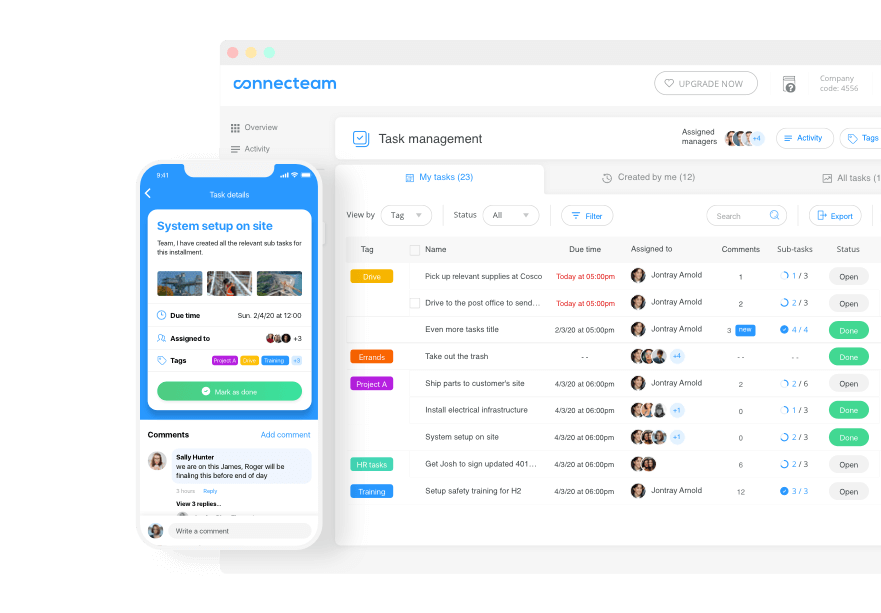The numbers are in and it’s clear that from 2020-2025, “the property management industry is expected to grow, along with rising rental costs and rising demand for floor space from US businesses.”
Seeing as how the property management industry is very lucrative and is becoming more popular makes it clear that now is a great time to learn more about how to start a property management business.
In addition, the industry is projected to grow by $23.63 billion by 2026 which just goes to show that even despite current situations, the time has never been riper to become your own boss.
We Share Our Full Guide On Starting a Property Management Business In 9 Easy Steps, See More Below!
Sort Out The Legal Framework
The first step to starting a property management company is to establish all the legal entities required. As such, you need to choose which kind of legal entity you want your property company to follow as this determines how much regulatory paperwork will be required to file, personal liability in terms of investment properties in your business, and also the taxes you need to pay.
Most choose to establish a Limited Liability Corporation (LLC) or file as an incorporated business (S-Corp or C-Corp). However, each comes with its own set of pros and cons so talk with your attorney to learn which legal structure is the right choice for your property management company.
After all the legal aspects of starting a property management business are completed, you need to choose a business name and logo and should find a bank to finance your business.
Create A Business Plan
After you have completed step one of how to start a property management business, you will next need to create a business plan that maps out your property business from start to finish. In essence, a business plan describes how your property business will evolve from beginning to end.
As we pointed out in the first tip, if you are in need of financial support from an investor or a financial institution then you have to create a business plan.
Get The Necessary Licenses & Certificates
As you continue starting your property management business, you need to see if the state you’re in requires a specific license as only six states don’t require any. You cannot work until you obtain up-to-date licensing.
The following are the most common licenses you need to obtain:
- Real Estate Broker’s License
- Property Manager’s License
- Real Estate Salesperson License
- Leasing Agent License
It can help build credibility if you also obtain some certifications; for example, if you are a certified property manager, then it can help you to also have a real estate broker’s license.

In addition, join some associations to gain even more credibility and to grow your team through development opportunities. Look into the following: The Institute of Real Estate Management (IREM), National Apartment Association (NAA), National Association of Residential Property Managers (NARPM), and National Association of Realtors (NAR).
Get An Office & Website
Now you need to start with an obvious step on how to start a property management business. Set up an office so you can meet with clients, current and prospective alike. (If you’re looking to keep business costs low then you can work from home and then can move to rent commercial office space as your business grows.)
Ensure you have all the necessary equipment and supplies to organize your workstation such as a laptop or computer, mobile phone, scanner, printer, fax machine, copier, file cabinet, and more.
As you’re establishing a physical office, start working on building your website. In 2020, it has never been more important to create an online presence. Everything is online now so make sure your customers can find you in the click of a button! This gives you credibility, enhances your chances of traffic and potential clients, and makes it easier for you to advertise your business.
Hire The Right People
There are two types of employees you’re going to want to hire.
First, you need contractors to help manage maintenance and repairs for numerous properties. Whether you hire a handyman or a fully licensed contractor, make sure you hire someone dependable and affordable as you’ll likely create a lasting working relationship with them.
Second, you also need to hire:
- Office secretary
- Accountant
- Payroll administrator
- Resident manager
- Sales representatives
- Property manager
- Maintenance coordinator
- Tenant administrator
Now, that’s just a small list of who to hire; check out this detailed list here on staff you need to hire as your business grows.
Your property management company can only ever be as good as its team. Therefore, you have to hire people with the right qualities and ask the right questions during the interview process.
Get The Right Software
Whether you’re just starting out or are more experienced at running a property management business, you need the right property management software to drive efficiency, productivity, revenue, and deliver more leasing units.
A property management app allows you to streamline processes, manage day-to-day operations, enhance communication, while also allowing you to get ahead of the competition through direct oversight on where your business stands so that you can execute smarter business decisions.
In fact, 42% of property managers want to adopt new technologies to keep their many properties relevant to tenants in today’s market.
Many property managers choose Connecteam’s all-in-one employee management app to effortlessly run their property management business. Connecteam offers many robust features so that property managers can focus on the bigger picture:

- Streamline communication: send logistical and operational communication, engaging updates, announcements, and more through communication features including chat groups, real-time push notifications, private chat, updates directly to your employee’s smartphone, and more.
- Smart groups: create content that is created especially for multiple teams including building managers, maintenance teams, and office staff, and send them updates, articles, news, and announcements such as new policies, new procedures, or getting into new territory.
- Fully searchable work directory: employees can easily search for a work contact via pre-determined profile attributes to easily make a phone call, send an email, or start a private chat, without needing to save contacts on their personal mobile device. This way it’s easy to locate who manages which building without losing valuable time.
- Task Management: create one-off tasks, for example during an inspection and you find an issue with something, like a busted pipe, then you can easily create a one-off task in real-time for maintenance to fix it. Create and assign tasks with built-in reminders and get notified once the task is completed.
- Automated workflows: for more routine tasks, you can easily create weekly or monthly checklists, including reviewing hazards in public areas are taken care of, or making sure maintenance comes once a month to inspect the elevators. Plus, all tasks are recorded for future reference, are shared with relevant people, and you can easily track who completed what task and when.
- Dispatching maintenance jobs with the schedule: dispatch maintenance jobs to a specific building or location and include shift tasks to get checked off when each task is done. Employees can add images, PDFs, digital signatures, and more if needed.
#1 Property Management App
Connecteam is the best solution for property managers and is an all-in-one app equipped with everything your business needs to run daily operations smoothly.
Create Your Pricing Structure
As we wind down the steps in starting a property management company, the next important step is to create a pricing structure that allows for consistent income but is also desirable in attracting new clients. Coming in too low or too high on the market will only keep clients away, no matter how great your property is.
The best way to establish desirable pricing for your area is to do some research! Call other property management companies in the area so you can discover what the going rates are.
These are the most common fees to consider when you’re setting up your pricing structure:
- Setup Fee: a one-time fee you charge landlords to create an account with your property management, usually it’s around $300
- Ongoing Management Fee: this is how you really make your money. This fee could be as low as 3% of monthly rental income or as much as 10%, it all depends on your local market. This covers day-to-day operations like communicating with renters, collecting rent, overseeing inspections, and managing repair and maintenance requests.
- Leasing Fee: a one-time fee for leasing a property when it is vacant. It’s equivalent to one month’s rent or a percentage of the rent (50%-75%). This includes staging, listing it, showing it, handling applications, screening prospective tenants, preparing the lease, and moving the new tenant in.
- Lease Renewal Fees: an optional fee you charge to renew the lease for an existing tenant, usually around $200.
- Eviction Fee: optional but is strongly advised as you may be asked to act as the representative for the property owner during the eviction process.
Always be aware of what your competition is charging for these services so that you can consider what your business will offer when creating a pricing structure.
Create A Marketing Strategy
You need effective marketing to run a successful property management business. Therefore, ensure that you maintain the following to boost your credibility and increase visibility:
- Create a clear website that describes what your company stands for and what services you offer
- Clearly label your pricing structure
- Be active on social channels (look at where your competition is most active)
- Ask for reviews and testimonials you can share on your website or social channels
- Paid ads so you can reach more clients and tenants
It’s All About Networking
We can’t discuss how to start a property management business without mentioning how valuable networking is. You have to be looking for clients regularly, it’s very rare that they just appear out of nowhere! Networking as often as possible is key.
“Virgin conducted a study and found that 84% say they prefer in-person meetings because they help to build stronger, more meaningful business relationships, allow for more complex strategic thinking and – most importantly – are a better environment for tough, timely decision-making.”
This shows that networking allows you to close 40% more sales. However, you must be strategic when participating in events. For starters, the event has to be worth it, don’t waste your time. Second, when at events, ask to be introduced to build credibility, and don’t forget that networking is a two-way street so be respectful of time, and find a reason to follow up with the person you’re talking to.
If you’re looking for even more tips and insights on effectively running your property management business, be sure to read our valuable guide on just that.
Wrapping Up How To Start A Property Management Business
With all of the tips we outlined above, you are well on your way to successfully launching your own property management business. It’s important to do your research so you can ensure all the T’s are crossed and I’s are dotted to ensure your company brings in revenue, creates productive employees, and happy tenants.
All-In-One Property Management App
Connecteam is the employee app that connects everything a property management business needs from field to office, all in one place. In the click of a button, you can connect your staff, manage day-to-day operations, improve employee experience and engagement, and drive your business forward.


![image of [Free eBook] Building an Effective Internal Communication Strategy](https://connecteam.com/wp-content/uploads/2020/07/Scene-4-768x512.png)
